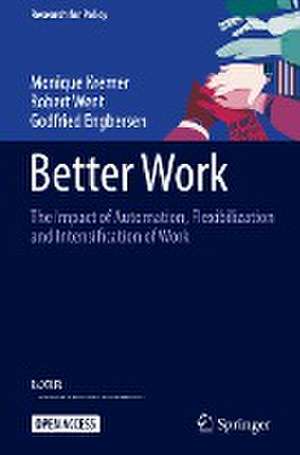Better Work: The Impact of Automation, Flexibilization and Intensification of Work: Research for Policy
Autor Monique Kremer, Robert Went, Godfried Engbersenen Limba Engleză Hardback – 13 noi 2021
Preț: 424.81 lei
Nou
Puncte Express: 637
Preț estimativ în valută:
81.31€ • 88.35$ • 68.35£
81.31€ • 88.35$ • 68.35£
Carte disponibilă
Livrare economică 31 martie-14 aprilie
Preluare comenzi: 021 569.72.76
Specificații
ISBN-13: 9783030786816
ISBN-10: 3030786811
Pagini: 204
Ilustrații: X, 204 p. 1 illus.
Dimensiuni: 155 x 235 mm
Greutate: 0.5 kg
Ediția:1st ed. 2021
Editura: Springer International Publishing
Colecția Springer
Seria Research for Policy
Locul publicării:Cham, Switzerland
ISBN-10: 3030786811
Pagini: 204
Ilustrații: X, 204 p. 1 illus.
Dimensiuni: 155 x 235 mm
Greutate: 0.5 kg
Ediția:1st ed. 2021
Editura: Springer International Publishing
Colecția Springer
Seria Research for Policy
Locul publicării:Cham, Switzerland
Cuprins
Chapter 1 Introduction.- Chapter 2 The importance of better work.- Part 1. Good work: development and current status.- Chapter 3 Control over income.- Chapter 4 Control over work.- Chapter 5 Control in life.- Part 2. Work for all.- Chapter 6 Everyone into work.- Part 3. The new societal mission.- Chapter 7. Room to choose good work.- Chapter 8 Better work: conclusions and recommendations.- Bibliography.
Notă biografică
Monique Kremer is a professor of active citizenship, department of sociology, University of Amsterdam, chair of the migration advisory board, and was previously employed at the WRR. She has published numerous books on a variety of topics, such as How welfare states care (2007, Amsterdam University Press), People, Policy and the New Pofessional (2006) and Vreemden in de verzorgingsstaat (2016, Strangers in the Welfare Sttate).
Robert Went (1955) works at the WRR since 2007. He has attained a doctorate in economics with a dissertation on globalization (Routledge 2002). Before he joined the WRR, he has worked among others at the Dutch court of audit (Algemene Rekenkamer) as a project manager. He has written a lot about economic issues for the general public, and is very active on twitter (@went1955). He is also a member of the board of Rethinking Economics in The Netherlands.
Godfried Engbersen, is a professor of sociology at Erasmus University Rotterdam and acouncil member of the WRR. Key themes in his research are social inequality and international migration. He published numerous books, among which (with others) A Continent Moving West: EU Enlargement and Labour Migration from Central and Eastern Europe (Amsterdam University Press 2010); Beyond Networks. Feedback in International Migration (Palgrave 2016), and Cultures of Unemployment (Routledge 2019).
Robert Went (1955) works at the WRR since 2007. He has attained a doctorate in economics with a dissertation on globalization (Routledge 2002). Before he joined the WRR, he has worked among others at the Dutch court of audit (Algemene Rekenkamer) as a project manager. He has written a lot about economic issues for the general public, and is very active on twitter (@went1955). He is also a member of the board of Rethinking Economics in The Netherlands.
Godfried Engbersen, is a professor of sociology at Erasmus University Rotterdam and acouncil member of the WRR. Key themes in his research are social inequality and international migration. He published numerous books, among which (with others) A Continent Moving West: EU Enlargement and Labour Migration from Central and Eastern Europe (Amsterdam University Press 2010); Beyond Networks. Feedback in International Migration (Palgrave 2016), and Cultures of Unemployment (Routledge 2019).
Textul de pe ultima copertă
This is an Open Access book. How can we make work better? It is an important question, one that the Dutch government, employers’ organizations and trade unions have been grappling with. People work to make money. But work also inspires self-respect, shapes our identity and gives us a sense of belonging – especially when the work we do is good. Good work is essential to prosperity in the broadest sense: to the quality of life we experience as individuals, to the economy and to society as a whole.
Work in the Netherlands could be better. In Better Work. The automation, flexibilization and intensification of work, the Netherlands Scientific Council for Government Policy offers nine recommendations to help all workers gain more control over their money, their work and their lives – the three basic conditions of good work. While the primary responsibility for good work lies with employers, the government can help through legislation and regulations,supervision and subsidies, and through its tenders.
Work in the Netherlands could be better. In Better Work. The automation, flexibilization and intensification of work, the Netherlands Scientific Council for Government Policy offers nine recommendations to help all workers gain more control over their money, their work and their lives – the three basic conditions of good work. While the primary responsibility for good work lies with employers, the government can help through legislation and regulations,supervision and subsidies, and through its tenders.
Caracteristici
This book is open access, which means that you have free and unlimited access The first book to analyses the effects of technologization, flexibilization and intensification of work for the quality of work Offers a clear definition of ‘good work’ based on academic work from various disciplines Suggests novel policy proposals based on a thorough analysis of the quality of work in the Netherlands The original Dutch version of the book has been well received in the Dutch media, by employers’ organizations, trade unions, academics, and in Dutch parliament








